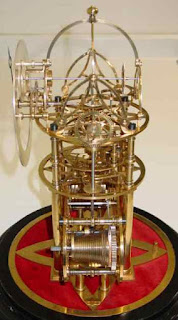With Leap Year and daylight savings time appearing within a few weeks of each other, I just had to explore 'time' as a subject.
Deep within our history, the beginning of our 'time concept' began. The very first people who populated this earth used the stars in the sky. From these they determined when it was time to move. Being hunter gatherers they depended on nature to guide their days, nights and movements.
'Water clocks' were among the earliest time keeping devices that didn't use the observation of the stars. The ancient Greeks, it is believed, began using water clocks around 325 BC. They were also used, in various forms, by other countries such as Egypt and Japan.
'Galieo's pendulum clock'
In 1656, 'Christian Huygens' (a Dutch scientist) made the first 'Pendulum clock with a mechanism using a 'natural' period of oscillation. Galileo is credited in most historical books for the invention of the pendulum as early as 1582 but his design, shown above, was not built before his death. Huygens' clock, when built, had an error of 'less than only one minute a day'. A fantastic 'leap' for timekeeping.
Later on came the spring assembly. This brought a much 'truer' technique of keeping time.
Oh how I loved to look at my grandfather's pocket watch. It would be considered an antique today, but to take off the back and watch it mark the seconds and minutes with with its little gears was an adventure to a young girl.
For the most part, today our clocks and watches are digital. I'm sure they keep much better time than those that required a clear night sky, water, pendulums and little gears and springs. But somehow along the way,the mystery and wonder of 'time' as an essence, has faded into the past. Did it not seem a bit more precious when we had to wind our watches? When it was not a thing to be manipulated as it is today?
As I reset our household clocks for Daylight Savings Time I will question our tinkering with time. And our apparent quest to 'tame' it to our own desires.
"By putting forward the hands of the clock you shall not advance the hour." - Victor Hugo








Oh no...I love digital. I used to wear a watch all the time, pun huh. Would search for the right one as a fashion statement. Actually I made quite a bit of money by selling watches with intricately beaded watch bands when that was the fad. I gladly gave up my watch when I realized I no longer needed it because I kept a cell phone. You have shared some interesting facts here. But when "Terry" switches the time on all of the clocks in the house this weekend..he will be swearing at our former state governor who pushed to have our time zone changed and kept daylight savings time.
ReplyDeletexx, Carol
So many thoughts about this. I think the operative word about the changes over the years with timepieces is "convenience". Like Carol, I no longer wear a watch either with my cell phone always at the ready. But my most nostalgic gift in high school from my future husband was an ornate watch. It was considered a "personal" gift back then, and I learned later that he felt required to get my parents' permission before giving it to me. How times have changed!
ReplyDeleteI love my watch. While I lose my cell phone frequently--is it in my purse in the hall, upstairs, in the bedroom, in the pocket of my robe? My watch is easy to find, right there on my wrist.
ReplyDeleteI truly dislike DST, and I think Victor Hugo nailed the incongruence of the idea in his quote.
It's getting hard to find someone to mend a wristwatch if you have one, too. I don't wear a watch, and I often don't remember to check my phone either. Timeless, my husband calls me!
ReplyDeleteInteresting post-and I also loved looking at my grandpa's pocket watch. There's something so beautiful about them-holding them-they fit so perfectly in your hand. And then there's the little pockets in the vests or on the pants that the watch fit in, and of course, the chain. I also loved the little watches that were pinned to women's dresses....
ReplyDelete